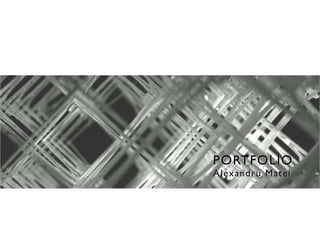PORTFOLIO_2016_a5
- 2. 2 Table of content 5 Who I am? 6 Sibiel regeneration project 12 Rehabilitation and Design of Johannes Honterus Courtyard 18 Cycle your way - Rediscover Sestao 24 Regeneration of Soveja Tourist Resort 30 Creative Centre for Students âFactory of Ideasâ 32 Urban Regeneration City Center Brasov 40 Floodplain redevelopment Room for the Danube river 44 Photography & Drowing 46 Contacts:
- 3. I am a passionate urban and spatial planner interested in understanding the complex processes and phenomena which take place in human settlements and to (co-)create smart and just solutions for them. This passion gave rise to a varied urban experience combining continuous learning and practical work in the European context. My main professional interest lies in integrated urban regeneration. Additional interests such as: alternative area transformation, temporary (re)use, placemaking, community development, integrated mobility, urban resilience and cultural tourism compliment my main interest. These interests had been tackled in various urban research, strategies, projects, design competitions and professional events. In my work, Iâve been involved in European projects and funding proposals and later developed my one initiatives as a freelancer. TheâRefresh Soveja 2012 rural regeneration initiativeâthat I initiated, developed and implemented was considered by participants a remarkable event. The academic experience in United Kingdom and The Netherlands coupled with close cooperation with Italian, Spanish and Dutch experts offered me a complex understanding of the EU professional and cultural realities. Last but not least, I am pensioned about photography which is for me great observation and exploration instrument. In order to achieve high quality results and positive urban changes in everything I do, I build my work on the pillars of trust, leadership, good communication, wise management, careful observation, thorough analysis, continuous (re)thinking, creative proposals and openness for new experiences. Letâs get in touch! Letâs meet! Letâs act! Letâs improve! 4 Who I am?
- 4. 6 Sibiel regeneration project Romania National Competition January 2013 Team project
- 5. 8
- 6. 10
- 7. 12 Rehabilitation and Design of Johannes Honterus Courtyard Brasov, Romania September - November 2011 National Competition Team project
- 8. 14
- 9. 16
- 10. 18 Cycle your way - Rediscover Sestao Sestao (ES) May - June 2011 International Competition - Europan 11 Team project Cycling Sestaoâs way into the future We propose an innovative urban design scheme as well as an exploration of ways in which Sestao can see itself evolve in the future, capitalizing and reinterpreting the assets of the place and the skills of the community. At the center of this vision is a venture to capitalize on the regionâs strong cycling culture, thus we see this project as cycling Sestaoâs way into the future: cycling it out spatially, through promoting an alternative mobility scheme, seen as a backbone for a new, vibrant neighborhood, cycling it out economically, through proposing a possible framework for economic development which revamps the regionâs steel tradition into an industry for the future, cycling it out socially, by promoting a community-based approach for a vibrant new neighborhood of Sestao. These three dimensions- spatial-environmental, social, economic are the three basic pillars of sustainability and of the resilient city. (Re)cycling tradition The backbone of our design project is the creation of a network of cycle lanes that will be distributed among the topography to provide an exciting cycling environment for residents of the neighborhood, but also for other people in Sestao, linking the central area to the youth center on the Nervion valley. This will dwell on the Basque tradition of biking, but also provide an incentive to adopt bicycle making as a new interpretation of the areaâs metalwork history. This might be also connected with a strategy of the local government to promote workshops and small businesses which make bicycles, in order to appropriate the industrial past and provide a new identity for the future. Place-making through community colonization Another focus of our plan is to bring forward a community-based place-making through colonization and appropriation of spaces by their residents. The idea is to provide the community with the space and the tools to make their own places. It is by integrating both the rich traditions and the thriving youth cultures of the region that we envision the shaping of these places. We want the spaces to become places through the energy and creativity of residents, providing them with a minimalistic design, but with tools to colonize these spaces. Thinking of the giza-abere probak (dragging games) or the harri zulaketa (hole drilling) but also of the expressivity of youth cultures, we see ways in which the locals can appropriate a number of spaces, using cubes, blocks, other modular elements, skating rinks or street art. We aim that a link will be forged between residents and place, inviting them to appropriate these spaces and thus create a place of meaning, inviting them to stay in and just cycle out for fun.
- 11. 20
- 12. 22
- 13. 24 Regeneration of Soveja Tourist Resort Soveja (RO) December 2010 - February 2011 National Competition - Team project
- 14. 26
- 15. 28
- 16. 30 Creative Centre for Students âFactory of Ideasâ February 2010 National Competition Individual project
- 17. 32 Urban Regeneration City Center Brasov Brasov (RO) December 2009 - February 2010 Individual project
- 18. 34
- 19. 36
- 20. 38
- 21. 40 Floodplain redevelopment Room for the Danube river Danube River (RO) March 2011 Team Project - Assignment
- 22. 42
- 23. Photography & Drowing 44 Study of light, shadows, composition. 2004-2011 Individual Project
- 24. Thank you for your interest! A l e x a n d r u M a t e i Urban (re)thinker +31 630845308 https://nl.linkedin.com/in/mateialexandru10 C o n t a c t s : 46























